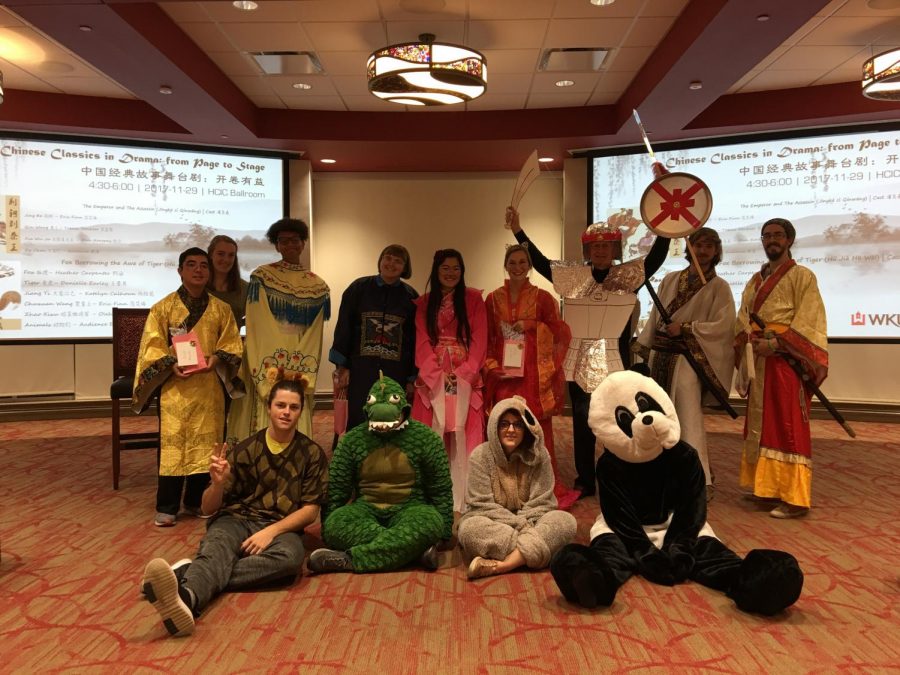Chinese Club teaches language, culture through interactive events
December 1, 2017
Classic tales of China came to life on the stage Wednesday night in the Honors College-International Center, during a pair of short plays performed in Mandarin by members of the Chinese club and Chinese major.
The plays were interactive by design, with screens prompting audience members to react to the events of the performance by screaming, laughing and clapping or to contribute dialogue to the scene. The actors ran through the audience during sword fights and prompted questions to those near by them to immerse spectators even further.
Audience members were also encouraged to dress up in traditional costumes provided by the Confucius Institute.
In The Emperor and the Assassin, which depicted the final battle of legendary mercenary Jing Ke who laid down his life to fight the conqueror of his homeland, participants donned elegant robes and dresses to represent the emperor’s court. Afterwards, they changed into any animal hats or costumes they may have owned to become wild animals in the forest during Fox Borrowing the Awe of the Tiger, a fable about a fox who befriends a tiger in order to be feared by other animals.
Following the performance, actors and audience members alike were encouraged to eat some Chinese snacks and take pictures in their costumes.
The event, said Ke Peng, faculty advisor of the Chinese club, served to provide students with a greater exposure to the art and language of classic stories.
“At the Advanced level, they are learning not only modern Chinese, they are also learning classics,” said Peng. “So how to relate the classic stories to the modern life, or their life experience, is very important.”
She highlighted a scene where the assassin Jing Ke sneaks a dagger into the emperor’s throne room, traditionally by hiding the dagger in a map he holds and convincing the guards he is unarmed. In the Chinese club’s rendition of the play, however, the cunning mercenary must go through an inspection mirroring an airport TSA security check, taking off his shoes and emptying his pockets of electronics.
“I think [the students] are blending what they observe in real life into the acting,” Peng said. This, she said, helps students relate to the stories and understand them in a more modern context.
These plays were the last of the Chinese club’s official events this semester. While this event targeted students in higher level 300- and 400-level classes, earlier events appealed to students of different levels in the Chinese program.
The Tongue Twister event, in which students competed to speak tricky phrases in Mandarin, tested the skills of beginner 100-level students, while 200-level students were the focus of a Chinese calligraphy workshop. For those with more advanced ability looking to challenge themselves, the Voice of WKU pitched students against each other in a battle of song – all in Mandarin, of course.
Each event strives to tailor to the different abilities and focuses of the separate levels, Peng said. The Tongue Twister event allows 100-level students to show off their newly-learned language skills, she said, but 200-level students are beginning to delve into Chinese culture, and learning about calligraphy exposes them to traditional culture. 300- and 400-level students are ready to demonstrate their skills on a level beyond simply speaking, so the Voice of WKU challenges them to learn “how to use song to express their emotions” in a language that is not their first, she said.
With the traditional play performances on Wednesday providing a final opportunity for the upper level students to test their skills, the Chinese club’s event season drew to a close. Those studying the Chinese language and culture will experience more interactive events next semester.
Reporter Chris DiMeo can be reached at 270-745-6288 and [email protected]













